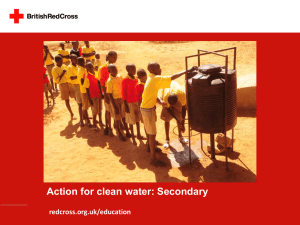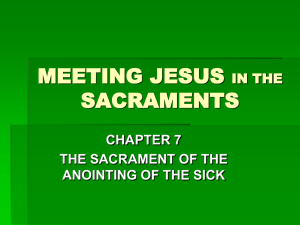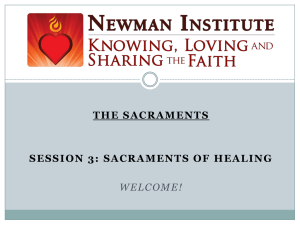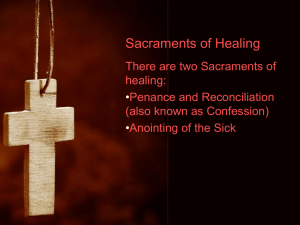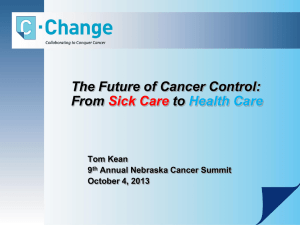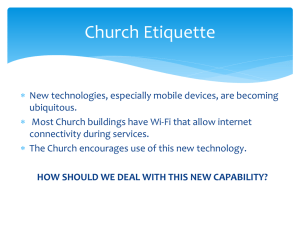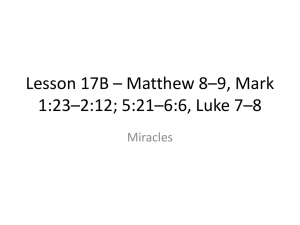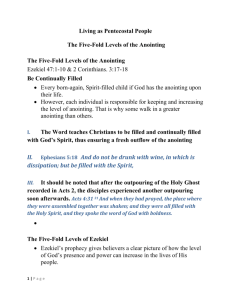Presentation 2 Anointing of the Sick 2013
advertisement
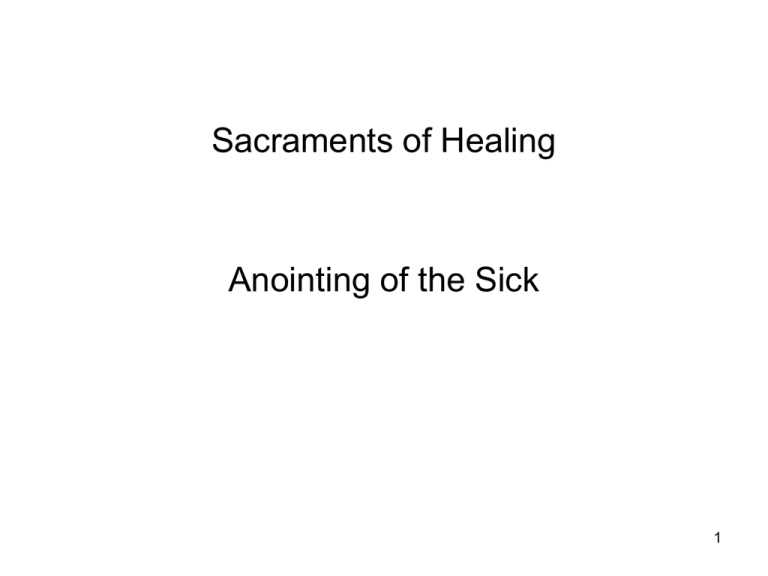
Sacraments of Healing Anointing of the Sick 1 “God of all consolation, you chose and sent your Son to heal the world. Graciously listen to our prayer of faith: send the power of your Holy Spirit, the Consoler, into this precious oil, this soothing ointment, this rich gift, this fruit of the earth. Bless the oil and sanctify it for our use. Make this oil a remedy for all who are anointed with it; heal them in body, soul, and in spirit, and deliver them from every affliction. We ask this through our Lord Jesus Christ, your Son, who lives and reign with you and the Holy Spirit, one God, for ever and ever. Amen” [Rites of the Blessing of the Oils & Consecrating the Chrism. Sacramentary Appendix II] 2 “Our tragedy is not that we suffer, but we waste suffering. Pain is God’s megaphone to arouse us from our deafness. It is only when we are afraid or bewildered, aware of our own helplessness, that we turn to God. If we are to be re-made, re-born, turned around, we must be first broken into pieces.” C.S. Lewis 3 • Definition of Sacrament: • An efficacious sign of grace, instituted by Christ and entrusted to the church, by which divine life is dispensed to us through the work of the Holy Spirit (CCC #1131, 774). 4 “Christ is the Sacrament of God” “Jesus is the Primordial Sacrament of the Father. By being the "Primordial Sacrament", Jesus Christ is much more than simply the originator of the Sacraments. He is at once the SOURCE, the PRIMARY AGENT, and the GOAL of all sacramental activity. As GOAL of all sacraments, Christ is the perfection toward which our life on earth tends.” 5 •As SOURCE, Christ is the one in whom all the sacraments are rooted and from whom they derive their efficacy. •As PRIMARY AGENT, he is the one who, through the actions and words of the minister celebrating the various sacraments, baptizes, confirms, forgives, and reconciles, heals, offers himself in sacrifice, binds in faithful love and consecrates for service. •As GOAL of all sacraments, Christ is the perfection toward which our life on earth tends.” 6 “Church is the Sacrament of Christ” “Since the Church, in Christ, is in the nature of sacrament – a sign and instrument, that is of communion with God, and of unity among all men (people).” (L.G) “Rising from the dead he sent his life-giving Spirit, upon his disciples and through him (the Holy Spirit) set up his Body which is the church, as the universal sacrament of salvation” (L.G. 48) 7 From Christ and the Church flow the Seven Sacraments * Initiation: Baptism Confirmation and Eucharist. * Healing: Penance and Anointing * Vocation: Marriage and Holy Orders. The Seven Sacraments are privileged moments of a present encounter between Christ, the church community, and individuals through the power of the Holy Spirit in faith for the life of the world. The sacraments give the grace they signify. 8 Sacrament of Anointing of the Sick: Who can celebrate the Sacrament of the Anointing of the Sick? 1.Those who are baptized 2. Those who have reached the use of reason 3. Those who are in a state of health that is seriously impaired by: a: Sickness b: Wounded c: Weakness of old age d: Preparing for surgery. 9 Scriptural Foundation: The miracles of Jesus. Miracles of physical healing Sight to the Blind [Jn.9:1-12] Hearing to the Deaf [Mk.7:31-37] Mobility to the Lame [Mt.8:5-11] Miracles of spiritual healing. Samaritan Woman [Jn.4: 30] Expulsion of Demons [[Mt.8:28-34] Woman taken in Adultery [Jn.8:2-11] Good Thief [Lk.23: 39-43] 10 • Gospels contain the healing miracles of Jesus: – Physical ailments and defects – Social sins – Outcasts and Marginalized • Jesus accomplishes the healing through prayer and the response in faith of the person(s). Used various earthly signs – Faith in Jesus as Messiah – Faith in God • Jesus used various earthly signs and symbols to accomplish the healing of people: – Spittle, Laying on of Hands – Mud and Washing 11 “Is anyone among you sick? Let him call for the presbyters of the Church, and let them pray over him, anointing him with oil in the name of the Lord; and the prayer of faith will save the sick man, and the Lord will raise him; and if he has committed sins, he will be forgiven.” (James 5:14-15) 12 “And Jesus summoned the twelve and began to send them out in pairs, and gave them authority over the unclean spirits; and He instructed them that they should take nothing for their journey, except a mere staff--no bread, no bag, no money in their belt-but to wear sandals; and He added, ‘Do not put on two tunics’." “And He said to them, ‘Wherever you enter a house, stay there until you leave town. Any place that does not receive you or listen to you, as you go out from there, shake the dust off the soles of your feet for a testimony against them.’ They went out and preached that men should repent. And they were casting out many demons and were anointing with oil many sick people and healing them.” (Mark 6:7-13) 13 "So they (the Twelve Apostles) went off and preached repentance. They drove out many demons, and they anointed with oil many who were sick and cured them." (Mark 6:12-13) "Is any among you sick? Let him call for the presbyters of the Church, and let them pray over him, anointing him with oil in the name of the Lord; and the prayer of faith will save the sick man, and the Lord will raise him up; and if he has committed sins, he will be forgiven." (James 5:14-15) 14 • Christ's compassion toward the sick and his many healings of every kind of infirmity are a resplendent sign that "God has visited his people" and that the Kingdom of God is close at hand. • Jesus has the power not only to heal, but also to forgive sins; he has come to heal the whole man, soul and body; he is the physician the sick have need of. (CCC 1503) 15 Sacrament of Anointing of the Sick: Subject Matter of Anointing of the Sick is Evil. Sickness and sin are related. Not to say a sick person is guilty of sin but sickness is a sign of a deeper more general evil abroad in the world. Object of Sacrament of Anointing is Grace Healing and Salvation. 1. Instrumental, efficient causality: (Aquinas) 2. Moral causality. 3. Occasional causality. 16 The matter of the Sacrament of the Anointing of the Sick is the olive oil blessed by a bishop, or in emergency vegetable oil. The form of the Sacrament of the Anointing of the Sick is the priest’s prayer. 17 • The Sacrament’s Effects A particular gift of the Holy Spirit. [CCC 1520] Union with the passion of Christ. [CCC 1521] An ecclesial grace. [CCC 1522] A preparation for the final journey. [CCC 1523] • "The special grace of the sacrament of the Anointing of the Sick has as its effects: - the uniting of the sick person to the passion of Christ, for his own good and that of the whole Church; - the strengthening, peace, and courage to endure in a Christian manner the sufferings of illness or old age; - the forgiveness of sins, if the sick person was not able to obtain it through the sacrament of Penance; - the restoration of health, if it is conducive to the salvation of his soul; - the preparation for passing over to eternal life. " [CCC 1532]. 18 History of the Sacrament of Anointing of the Sick The Early Church continued Christ's ministry of healing. The disciples of Jesus, witnessed His healing power they followed His charge to them to: Forgive sins Heal sick Heal those who were separated from the community because of sinfulness or sickness 19 • For the early church, the central action of community life was gathering to remember Jesus at the Eucharist. • All religious activities were centered around the Eucharist. • Community prayed for those who were absent and the sick. • Reconciliation was important and forgiveness generated peace with one another. 20 The disciples and the elders carried on the healing ministry by: Prayer with and over the person Anointing in the name of the Lord Person’s faith plays key role (Mk 6.13) (Jas 5:14-15) 21 John Chrysostom "The priests of Judaism had power to cleanse the body from leprosy—or rather, not to cleanse it at all, but to declare a person as having been cleansed. . . . Our priests have received the power not of treating with the leprosy of the body, but with spiritual uncleanness; not of declaring cleansed, but of actually cleansing. . . . Priests accomplish this not only by teaching and admonishing, but also by the help of prayer. Not only at the time of our regeneration [in baptism], but even afterward, they have the authority to forgive sins: ‘Is there anyone among you sick? Let him call in the priests of the church, and let them pray over him, anointing him with oil in the name of the Lord. And the prayer of faith shall save the sick man, and the Lord shall raise him up, and if he has committed sins, he shall be forgiven’" (On the Priesthood 3:6:190ff [A.D. 387]). 22 • Extreme Unction: The name for the sacrament in the West from the late twelfth century until 1972. The word "extreme" indicated either that it was the last of the sacramental unctions (after the unctions at Baptism, Confirmation and, if received, Holy Orders) or because at that time it was normally administered only when a patient was in extremis 23 Sacrament of Anointing of the Sick 9th-15th Century Sacrament of Healing becomes the Sacrament of Extreme Unction Unction = anointing Last of the anointings: 1st = Baptism, 2nd = Confirmation Emphasis was no longer on healing but on death Extreme Unction was combined with Penance and Viaticum (Eucharist) and was known as “The Last Rites” Extreme Unction was only administered once; typically at the point of death 24 “When the Church cares for the sick, it serves Christ himself in the suffering members of his Mystical Body. When it follows the example of the Lord Jesus, who “went about doing good and healing all” (Acts 10:38), the Church obeys his command to care for the sick. (Mk 16:18) The Church shows this solicitude not only by visiting those who are in poor health but also by raising them up through the sacrament of anointing and by nourishing them with the Eucharist during their illness and when they are in danger of death. Finally, the Church offers prayers for the sick to commend them to God, especially in the last crisis of life.” [Decree from “Sacram Unctionem Infirmorun,” Paul VI 1972] 25 Vatican II Renewal of the Sacrament • Renewed focus on providing grace and help at a time of sickness • Holy Spirit strengthens us and gives us hope in the face of suffering • Celebrated within context of Liturgy of the Word – Laying on of Hands by minister (priest) – Anointing with the Oil of the Sick – Anointing on head and hands • Celebrated privately or in a communal setting within celebration of the Eucharist • Celebrated more than once, not only at the end of life but in time of illness 26 • Celebrating the Sacrament of Anointing the Sick • The Sacrament of the Anointing of the Sick can be celebrated within the Mass. • If the celebration takes place outside of Mass, it can be celebrated in the home, in a hospital, or in the church. 27 World Day of the Sick In 1992, Pope John Paul II introduced the celebration of the World Day of the Sick on the Feast of Our Lady of Lourdes. February 11th This annual celebration gives people a chance to pray for and deepen their solidarity with the sick and injured among us. 28 The Sacrament of the Anointing of the Sick vs. The Order for the Blessing of the Sick. The blessing of the sick by the ministers of the Church is a very ancient custom, having its origins in the practice of Christ himself and his apostles. When ministers visit those who are sick, they are to respect the provisions of Pastoral Care of the Sick: Rites of Anointing and Viaticum, nos. 42-56, but the primary concern of every minister should be to show the sick how much Christ and his Church are concerned for them. The text of Pastoral Care of the Sick indicates many occasions for blessing the sick and provides the blessing formularies. The present order may be used by a priest or deacon. It may also be used by a layperson, who follows the rites and prayers designated for a lay minister. While maintaining the structure and chief elements of the rite, the minister should adapt the celebration to the circumstances of the place and the people involved. 29 The Ritual Prayer includes Prayers for Various Circumstances: General In Extreme or Terminal Illness In Advanced Age Before Surgery For a Child For a Younger Person 30 Rite for Anointing of the Sick Introductory Rites: Greeting Reception of the Sick Penitential Rite Opening Prayer Liturgy of the Word Liturgy of Anointing Litany Laying on of Hands Prayer over the Oil Anointing Prayer after Anointing Liturgy of the Eucharist Concluding Rites Blessing Dismissal 31 Anointing in a Hospital or Institution Introductory Rites: Greeting Instruction Liturgy of Anointing: Laying on of Hands Anointing The Lord’s Prayer Prayer after Anointing Concluding Rites: Blessing 32 The Lord Jesus Christ, physician of our souls and bodies, who forgave the sins of the paralytic and restored him to bodily health, has willed that his Church continue, in the power of the Holy Spirit, his work of healing and salvation, even among her own members. This is the purpose of the two sacraments of healing: the sacrament of Penance and the sacrament of Anointing of the Sick. (CCC1421) 33 Our Father, who art in heaven, Hallowed be thy Name. Thy kingdom come. Thy will be done, On earth as it is in heaven. Give us this day our daily bread. And forgive us our trespasses, As we forgive those who trespass against us. And lead us not into temptation, But deliver us from evil. For the kingdom, the power, and the glory are yours, now and forever. Amen. 34
